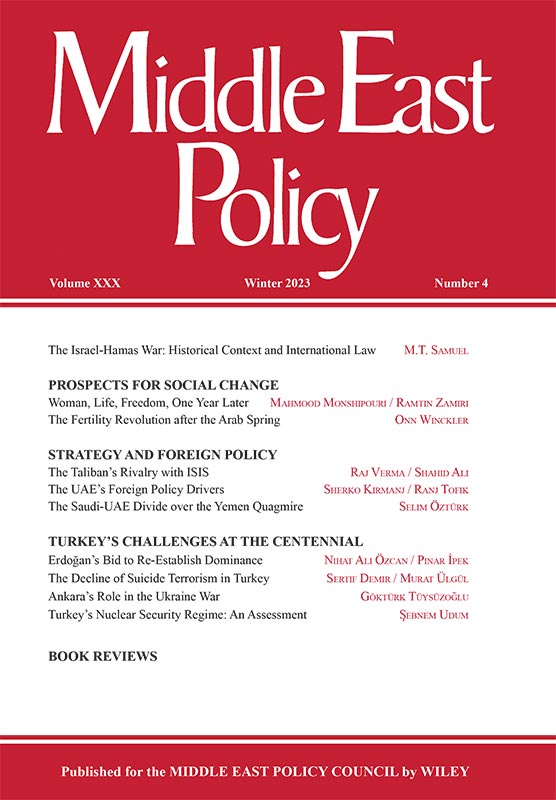
Middle East Policy
Volume XXX, Issue 4
Winter 2023
This publication, the 158th of the journal’s 40-year history, covers a wide range of topics, from conflict in Israel and Palestine to the foreign policies of Gulf states to Turkey’s challenges and opportunities as it marks 100 years.
Qatar and the Gulf Crisis
Book Author: Kristian Coates Ulrichsen Reviewer: Irina Andriiuc Reviewer Title: Graduate student, Doha Institute for Graduate Studies, Doha, Qatar. Publishing Info: Oxford University Press, 2020. 348 pages. $37.50, hardcover. https://www.amazon.com/Qatar-Crisis-Kristian-Coates-Ulrichsen/dp/0197525598 Middle East ...
PROSPECTS FOR SOCIAL CHANGE
Benghazi! A New History of the Fiasco That Pushed America and Its World to the Brink
Book Author: Ethan Chorin Reviewer: Ronald Bruce St John Reviewer Title: Independent scholar; author of Libya: Continuity and Change, second edition (Routledge, 2015). Publishing Info: Hachette Books, 2022. 432 pages. $30, hardcover. ...
The Arc of a Covenant: The United States, Israel, and the Fate of the Jewish People
Book Author: Walter Russell Mead Reviewer: Richard J. Schmierer Reviewer Title: Former US ambassador to Oman; president and chairman of the board emeritus, Middle East Policy Council Publishing Info: Knopf, 2022. 672 ...
STRATEGY AND FOREIGN POLICY
The Israel-Hamas War: Historical Context and International Law
This essay contextualizes the 2023 Israel-Hamas war within a century-old legal history of Palestinian dispossession that has been facilitated through the violation and misuse of international law. It argues that Hamas's attacks ...
Woman, Life, Freedom, One Year Later: Will the Iran Protests Succeed?
This essay argues that the recent protests in Iran, ostensibly driven by the Woman, Life, Freedom movement, are a symbol of a far greater dissatisfaction with arbitrary rule, corruption, and incompetence. While ...
The Fertility Revolution of the Arab Countries Following the Arab Spring
Abstract While the Arab Spring was primarily a revolution of young civilians against the old regimes, its influence on fertility patterns and natalist policies has not received sufficient attention. The first part ...
TURKEY'S CHALLENGES AT THE CENTENNIAL
The Gulf’s Investment in China: On the Rise or At Its Peak?
This article examines the growth and shifts in Gulf countries’ sovereign wealth investment patterns in the Chinese market and their place in the US-China rivalry. In December 2023, the FII Priority Summit ...
Qatar and the Gulf Crisis
Book Author: Kristian Coates Ulrichsen Reviewer: Irina Andriiuc Reviewer Title: Graduate student, Doha Institute for Graduate Studies, Doha, Qatar. Publishing Info: Oxford University Press, 2020. 348 pages. $37.50, hardcover. https://www.amazon.com/Qatar-Crisis-Kristian-Coates-Ulrichsen/dp/0197525598 Middle East ...
Benghazi! A New History of the Fiasco That Pushed America and Its World to the Brink
Book Author: Ethan Chorin Reviewer: Ronald Bruce St John Reviewer Title: Independent scholar; author of Libya: Continuity and Change, second edition (Routledge, 2015). Publishing Info: Hachette Books, 2022. 432 pages. $30, hardcover. ...
The Arc of a Covenant: The United States, Israel, and the Fate of the Jewish People
Book Author: Walter Russell Mead Reviewer: Richard J. Schmierer Reviewer Title: Former US ambassador to Oman; president and chairman of the board emeritus, Middle East Policy Council Publishing Info: Knopf, 2022. 672 ...
BOOK REVIEWS
Qatar and the Gulf Crisis
Book Author: Kristian Coates Ulrichsen Reviewer: Irina Andriiuc Reviewer Title: Graduate student, Doha Institute for Graduate Studies, Doha, […]
Benghazi! A New History of the Fiasco That Pushed America and Its World to the Brink
Book Author: Ethan Chorin Reviewer: Ronald Bruce St John Reviewer Title: Independent scholar; author of Libya: Continuity and […]
The Arc of a Covenant: The United States, Israel, and the Fate of the Jewish People
Book Author: Walter Russell Mead Reviewer: Richard J. Schmierer Reviewer Title: Former US ambassador to Oman; president and […]